








Drew Rodriguez-Michel, Jimmy Carlson, Billy Bratton, Will Prim, Sofia Durdag (ed.), Lily Akre, Adiana Contreras, Ethan Whiteaker, and Stewie Goon



cover by adiana conteras <3
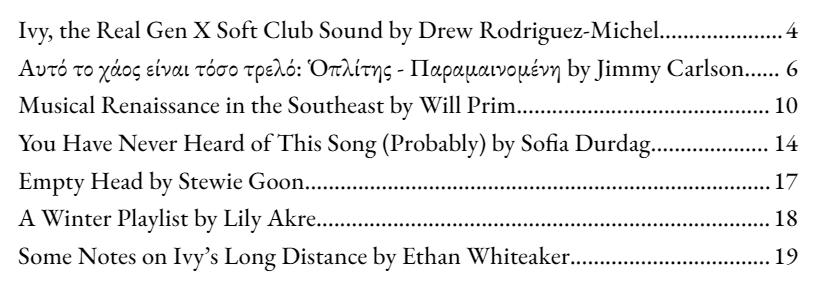
first and foremost, i figured out how to make a table of contents! i did have to use google docs and the snip tool, but a victory is a victory nonetheless. but enough about the most boring part of this entire, electric magazine! this issue is so special for many reasons. We have two separate, brilliant takes on the same excellent Ivy album, reflections on a hometown music scene, poetry, a review of a Homeric black metal epic, and so much more. it was a weird winter, but no fidelity pulled through and made all the best, strangest, most thoughtful stuff. thanks to our bravehearted contributors, and adiana for the beautiful cover of the record libe, one of the coolest spaces on campus (and also where no fidelity has their meetings).
If this is your first issue, welcome. NoFi is open to all students interested in or passionate about music, art, pop culture and welcomes all varieties of submissions. Email durdags@carleton.edu with questions, inquiries, etc.
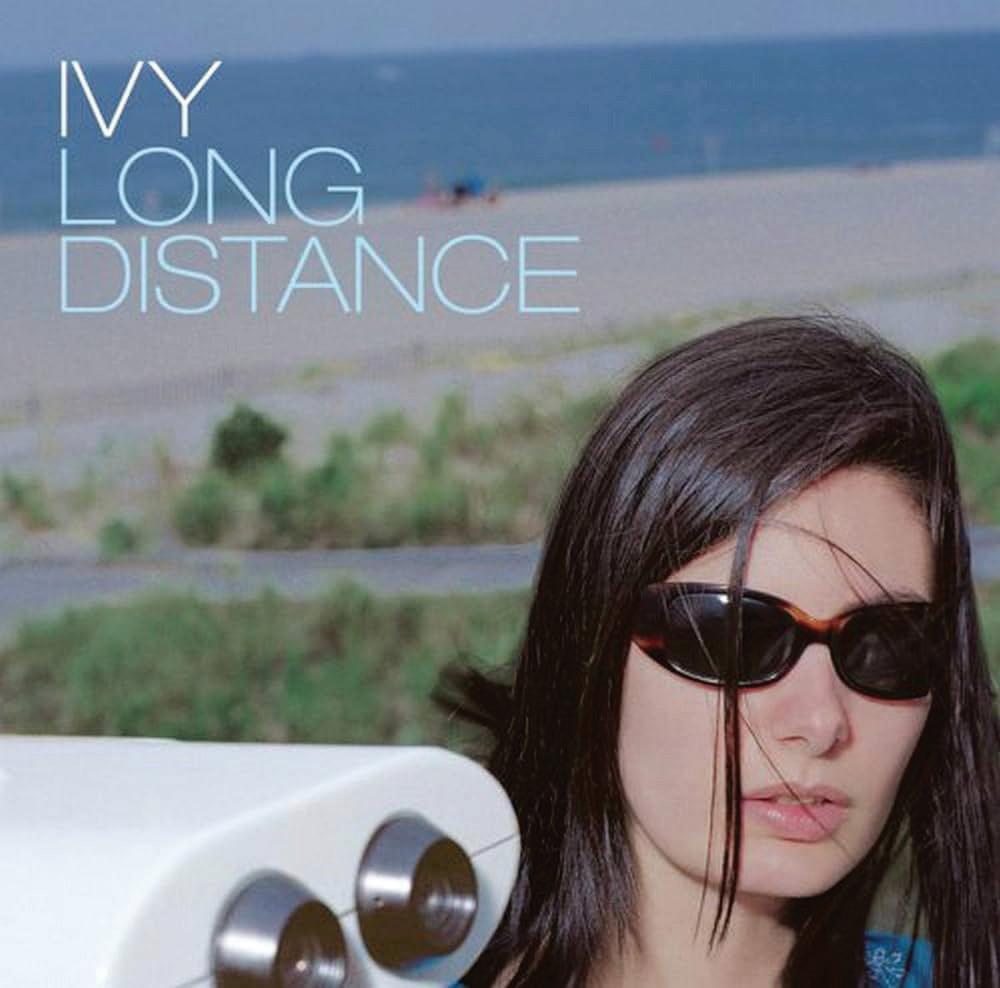
It was a weekend night, and I texted Ethan Whiteaker, my one-stop shop for sounds I’ve never heard before. My spotify discover if you will, but with an algorithm to best all, and the personal touch of someone who seems like they knew me in high school, in a good way.
I made a simple request: “Yearning whimsical choralesque female vocals synth—” and out popped a plethora of recommendations. This is by far my favorite: a record called Long Distance by a band named Ivy. They’re 2000s-era American Indie Pop sound broadly speaking, but with a self-conscious trip-hop beat that makes a few appearances, some rockier guitar melodies, and a bit of twang on top. Beautiful and airy. And very young-woman-in-her-20s. Right on the nose.
The band was a trio: Andy Chase and Adam Schlesinger producing and mixing, and Dominique Durand, a then-novice singer, doing vocals. The story of their meeting goes something like this: Back in ‘91, Chase placed an ad in the Village Voice, an alternative publication in Greenwich Village, to find music collaborators, and there he found Schlesinger. Within the next 3 years they met Paris-born, New York newbie Durand, who won them over with her “silky” vocals, and the rest, it seems, is history (All Music).
Long Distance is the best of their slim discography, and, like my favorite albums (for better or worse) it’s got great cover art. Brightly lit, Durand, with sunglasses and a strand of hair in her face, looks out towards beyond with an out-of-focus beach behind her. Pondersome. Mysterious. A little vintage. Yep, listening.
The sound itself is spacey, and if you’re not into that sort of thing, easily forgettable. But if you’re into whimsy and whisper, like low-waisted and maybe even ¾ things, or just feel a little adrift (but still love to think about love, because it’s the stuff of life, after all), then this is for you. And I hate to say it, but it’s particularly trendy as the glitz of Y2K is on the outs and the ‘truethousands’— i.e. the more muted, corporate sleaze, sepia chic palette of Gen X-ers in their mid 20’s– grips cultural avant-gardists near you.
Here’s my fast and quick rundown:
If you’re only here for the hits, start with “Disappointed.” It’s got a super catchy electric guitar sequence that slowly simmers in a soft bass and drums before darkening with the addition of a queasy, acidic mellotron that’s sure to seduce those that listen to Portishead and Massive Attack “for fun.” That paired with Durand’s fresh vocals and simple lyrics makes for the best kind of earworm: a well-balanced one.
“While We’re in Love” sounds like the opener to an Indie movie. Incredible romanticization possibilities. Endless, really. Wacky synth intro, spooky bass, great beat drop. Yearning begets yearning, and a bridge that could convince those “over it” that there’s still something left to consider. Oof.
“One More Last Kiss” is the less eager, less saccharine older cousin of P!nk’s “Blow me (One Last Kiss).” It’s not a teenage sort of love. It’s a little Liz Phair, on a park bench in the middle of the afternoon, maybe just after 2 or so. There’s still a day to be had, but the sun isn’t blinding, you know?
“Lucy Doesn’t Love You.” It’s a little more upbeat, a bit faster, a cheery horn or two, and some other wacky synths. It’s a nice chin-up for the (lovely) glumness the album otherwise casts. Plain and simple, Lucy doesn’t love you, and that’s just fine; you could even boogie to it. In an awkward, New-wavey way, though, obviously.
And lastly, “Undertow.” It’s the opener, and yes, I saved it for last. It’s an incredible kiddie pool into Ivy’s sound, but not the very best. Goes down easy, and makes me want to stay right put. So this is me allotting you a well-rounded floating and floundering, only now that you’ve peeked into the deep end. It’s safe.
If the album were a color, it would have to be Heather. Perhaps I’m imprinting a Soft-Club aesthetic upon a strictly Devil-Wears-Prada-esque Cerulean blue, or maybe it’s the soft club asserting itself out after years in the shadows. Either way, it feels right. It’s washed out, and somehow fresher because of it.
If you give it a listen, you’ve gotta tell me what you think. And since I’m not around in the flesh, give Ethan Whiteaker a proper kudos for keeping us all “female vocals synth-ing” when we wanna be. Hit the spot like “ahh.”






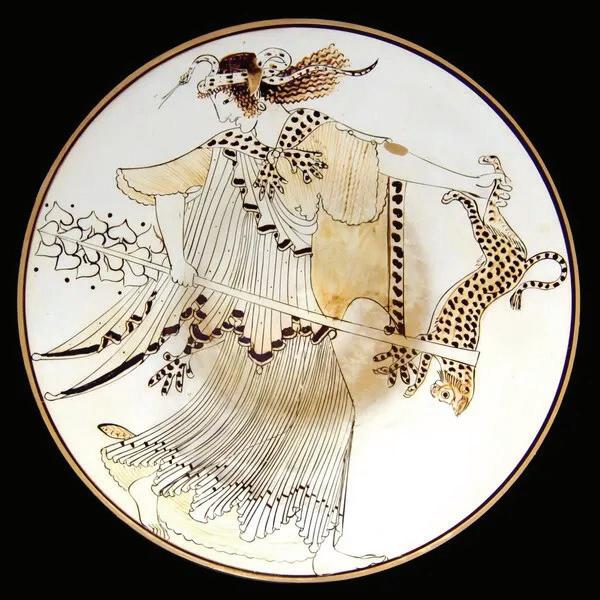
Chaos. Divine rage. Saxophone.

Ὁπλίτης (Hoplites) is the avant-garde black metal solo project of Zhenyang Liu, aka Λοιδορία (Loidoria, meaning something like “to speak reproachfully”). He is a Chinese native, a linguist, and as will become increasingly clear, he has a serious thing for Ancient Greek. His output as Hoplites is brutal, dissonant, chunky, wailing, and unpredictable. It’s also quite proli c, with ve studio albums in four years, but the project still remains deep under the ground. e most recent Hoplites album, Παραμαινομένη (Paramainoméni, or “perpetuated”) came out on January 12 this year.
I learned about Hoplites when I went on RateYourMusic.com in the middle of January, and saw that Paramainoméni was the top album (at the time) for 2024. I had never heard of Hoplites before, but the second I saw that ancient leopardsnatching hipster on top of the list, I knew I had to give it a listen. As a metalhead, whenever I see metal nd recognition outside of metalhead circles, I can’t help but feel some excitement (and a little pride tbh). An avant-garde black metal album topping the year’s charts, if even for just the rst few weeks, was cause for celebration. I hadn’t had the best experiences with “avant-garde” metal before, but this one seemed di erent somehow. As soon as I had the time, I pressed play.












e rst song on Paramainoméni is “Mínin áeide, theá paramainoméni emoú…,” (No more Greek characters, this one means “Stay with me O Gods…”) whose title is based o the rst lines of the Iliad. It begins with so drumming and Greek chant-singing that feels like it comes from another age, but soon explodes into a maelstrom of grindy guitars, grindier programmed drums, white noise screaming, and screeching saxophone. is wall of noise continues unabated for two minutes, then collapses just enough for patterns to maintain themselves for a minute at a time, but the song never nds any lasting center in its ten minute runtime. Unlike a lot of the cool, hip, jazzy extreme metal out there, this song uses sax as a way to enhance the insanity, not to ease it. It’s an element that always comes from completely out of le eld, and which somehow tears the song up even more than the distorted lead guitars. “Mínin áeide…” as a whole sets a very brutal precedent for the rest of the album and I am HERE for it. It ends with the sound of heavy breathing, the perfect way to decompress before the onslaught continues.
Loidoria takes things in a slightly more sane direction, but only slightly, on “Paradeigmatizoméni Mousikí” (“Sampled Music,” don’t ask me why that’s the title, it’s not sampled). It starts o very heavy, but when the sax comes in, it cools o the heat just a bit rather than intensifying it like it did on the rst song. e e ect is sick. e songwriting here brings a bit more repetition and more emphasis on space to let the trippy, blackened melodies really sink in as well, though the structure overall is just as wandering and uncentered as in the rst song. A manic, grinding, dissonant nish reminds us just what kind of album we’re listening to. Anyone who likes the rst song will probably like this one even more.
I don’t have so much to say about “I tón lyssimáton ángelos” (“ e Angel of Rage”). In my opinion it relies too much on repetitive and basic dissonant guitar ri s to feel as dynamic and engaging as the other songs. e drop in sax quantity is also tragic. One of my least favorite parts of the track is actually very cool in that it calls back to a song called “theía manía” (“divine rage”) from a previous Hoplites album, making the ri a symbol of that same concept. Loidoria’s description for Paramainoméni on Bandcamp is simply (in Greek) “I did this out of divine rage,” so this decision seems important, but it just doesn’t hit as hard as it could. Considering the place the listener is in at the end of song two though, it doesn’t seem so unreasonable for a track like this to come in when it does, and some of the ri s are nasty.
Songs number 4 and 5 have almost identical titles: “Symmainómenai Dionýso Ele hério” and “Symmiainómenai Dionýso Ele hério.” According to a Greek commenter on YouTube they mean together “Being forceful/maniacal alongside Dionysus the Freed One” (thanks, @A er9waves). e songs are de nitely not the same, possibly re ecting that adjective shi . e rst is possibly the most loose-feeling song so far. It starts with this moody low-end sax dissonance and just ows through these sensible black metal ideas for the rst 3:20. en things get intense, vocals come in, and it winds up in another ten minute song, full of brutal guitar ri s, bludgeoning programmed drums, and nasty screaming. It has some satisfying ri s (and a piano interlude?), it’s imaginative, and I recommend it. But holy shit the one a er!!
“Symmiainómenai Dionýso Ele hério” is this album’s attempt at a straightforward banger, lasting a mere 6:43 and having vocal lines that repeat at multiple points in the song (“poser!” I hear from the legions of avant-garde black metal fans who are totally reading this). Given the more fast-paced songwriting in other Hoplites albums, it’s no surprise that this more centered songwriting approach is successful.












e song kicks o with heavy ri ng that is dissonant and abrasive but also groovy as shit, and that energy continues in dynamic, blistering, headbanging fashion until about the four minute mark, where it reaches a possible end point, but it doesn’t stop there. In comes the thrashiest ri so far on this album, and then it’s this absolute fever dream of soaring synths (yes! SYNTHS!) and shredding, melodic-ass guitar solos before the chorus returns to nish it all o . e way that this relatively normal song structure mixes with Loidoria’s dynamic, progressive songwriting tendencies is just awesome, and has given me multiple eargasms. “Being maniacal alongside Dionysus the Freed One” is RIGHT. But I digress.
e album nishes with “Ápafsta theía manía,” Unrelenting Divine Rage, which serves as the outro. It begins on a muted instrumental section featuring a lo y saxophone solo over low-end rhythm guitar, which fades out into plucked strings (including harp I think?) and sopori c Greek chanting. e strings go on quite the journey themselves, and it provides a very refreshing and epic experience a er the depraved insanity that came earlier on the album. e strings reach a climax, and fade out, replaced by grinding distorted guitars, drums, and bass once again. ese too reach a crescendo, featuring plenty of screaming, and then everything drops out. e nal sounds we hear are heavy inhaling and exhaling, ending the last track in the same way as the rst.
Paramainoméni is sick. It is uncompromisingly intense, but also lets itself out of the modern extreme metal box enough to have compelling melodies and high quality prog wankery. Compared to earlier Hoplites projects, it’s clear that Loidoria is taking the project in a more progressive, abstract-feeling direction, and that’s got me excited. Some points aren’t as exciting as others, and the programmed drums make everything more at-feeling than it should be tbh. at said, this album rips, and the fact that it’s so original and fresh makes me hopeful for the future of metal, a genre too o en obsessed with recycling past innovations. e fact that parts of it are so accessible shows me a new side to this whole “avant-garde” thing, which I’ll have to explore further.
TL;DR: Homer fanboy makes an avant-garde black metal album about the wrath of God, or something. Abstract, winding song structures and lots of sax, but also heavy, modern, thrashy black metal and a serious banger towards the end. Check it out.






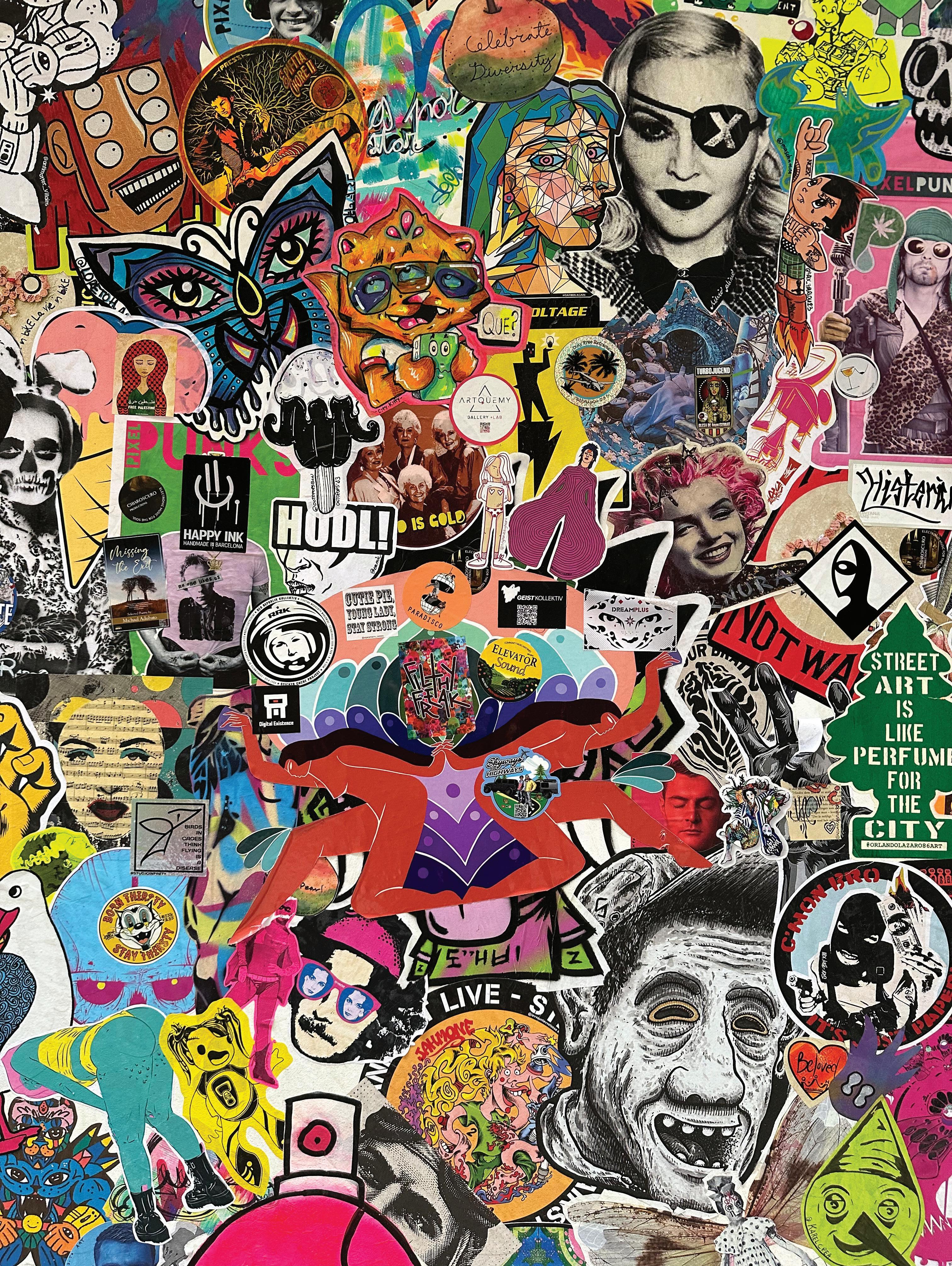

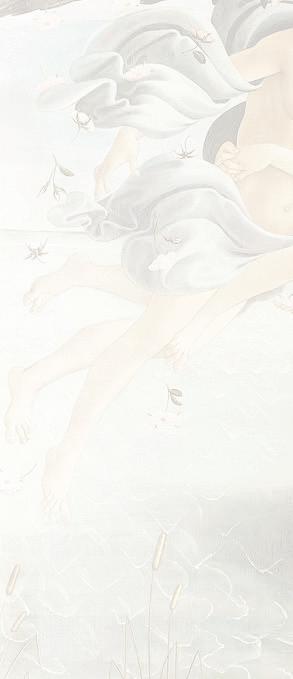
Growing up as a semi-indie kid in rural Georgia, it took me a long time to nd artists that I had any sort of shared experience with. In middle school and highschool, a the bands I geeked out about were either from California or some major city in the Northeast. A the artists that I listened to or knew of that had a similar regional a liation to myself were more in the world of bluegrass, folk, and jam-band music. For be er or for worse, I’ love jam-bands like Phish until my ashes are sca ered, but It wasn’t until I discovered The Glands that I realized there was a serious lack of indie rock out ts that had a claim and connection to the southeast in my musical armory. The Glands seriously changed the game for me; they were a band from Athens, GA that, fo owing in the musical tradition of the Elephant 6 Recording Co, created these wonderfu y composed, weird, pop-oriented indie rock tunes and were a staple in the Athens music scene until Ross Shapiro’s death in 2016. When I heard The Glands for the rst time in highschool, I was struck by how representative and anchored in Athens and Southeastern musical culture the music felt. It blew my mind.
Since that point, I’ve been on the search for music coming out of the Southeast that pushes the musical envelope of the genres I enjoy, and are outside the dominant realm of country/folk/bluegrass music that continues to saturate Southern music culture (though I do enjoy them a as we ).
In the past year especia y, there’s been a wave of bands breaking onto the scene from the southeast that has rea y rocked my world. There’s a southern music renaissance that is unfolding before a of our eyes, and a lot of it has gone unnoticed (we , somewhat). I have created a short list of some of the ho est bands coming out of the Dirty South, and have recommended a couple of my favorite songs for each group:
1. Sword II Atlanta, Georgia
Sword II is the best thing to happen to Atlanta since Hammerin’ Hank Aaron. More in line with the Philadelphia shoegaze scene, Sword II blends glitchy electronic music with heavily distorted guitar hooks, creating dark, dreamy songs that I can’t get enough of.
The gri y, new-wave, hyper pop-oriented raucous of their rst EP, “Between II Gardens,” projected Sword II into the lime-light of the underground music publication world, and their rst album “Spirit World Tour,” which was released in June of 2023, has shot them further shoegaze-stardom. The tracks on “Spirit World Tour” range from melancholy, guitar heavy rock songs, to spastic electronic music, to lush pop songs. Since its release, they have toured with other heavy hi ers like TAGABOW, Hotline TNT, and Toner, while also doing an opening tour for Beach Fossils this past fa . Sword II is my pick for the best music to come out of the South in the last couple of years.
Songs to check out: Silver, First Rule of the Bug, Shower, Master Plan
2. Snõõper Nashvi e, Tennessee
Egg-punk is having a comeback, and Snõõper is one of its artsy knights in shining, paper mache, armor. Based out of Nashvi e, Tennessee, Snõõper makes spedup, danceable, jagged, punk songs with wry comedic lyrics. Coming from the drum-machine punk tradition, most of Snõõper’s tunes fa within a certain tempo that’s certainly over 150 beats per minute, while nding fun and intricate ways to create danceable guitar punk ri s over a consistent backing track.
Though the group did not have plans to perform at their impetus, their live shows have become a spectacle. I saw Snõõper at 7th Street Entry this past October, and was blown away by how tight their live performance was, as we as the complete sensory experience of it a . At one point during their show, lead singer Blair Trammel power-li ed a paper mache barbe , while mu eted guitarist Connor Cummins clung onto the ra ers blew a refs whistle, at the same time as bassist Happy Haugen ran joined the pit as a pointy green paper mache gure (seen in the image below) caused general havoc throughout the oor. It was phenomenal. Snõõper leans into the performanceart aspect of punk music that I love so dearly and are truly a sight to behold.
Songs to check out: Running, Pod, Xerox
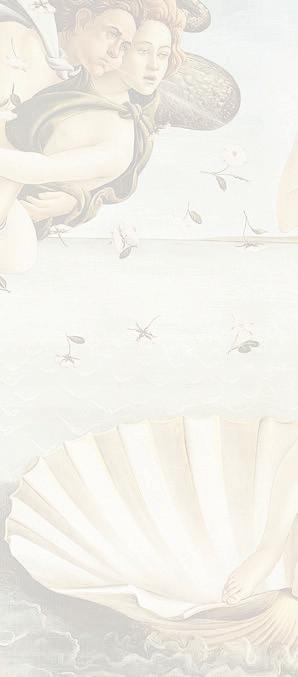
As one of the up-and-coming indie rock stars on the scene today, MJ, or Jake, Lenderman is a true purveyor of melodic, modern Southern music. As I felt with The Glands, MJ feels intrinsica y connected with the ro ing mountains of North Carolina and the unique culture that presides there. From quick, lotunes like “Someone Get the Gri Out of the Rain,” to his slow-building droning tunes like “Ghost of your guitar solo,” to his most recent southern-rock oriented tunes like “You Have Bought Yourself a Boat” and “Rudolph,” MJ has tackled indie rock in a unique way that truly hits me. MJ’s lyrical wi iness, emotional depth and candidness strikes the heart, especia y in tunes like “TV Dinner,” while his moresouthern steel guitar rock songs like “You have bought yourself a boat” makes me want to drink a beer and jump in the Cha ahoochee River.
As the guitar player for the band Wednesday as we , MJ has paired up and recorded with singer and guitar player Karly Hartzman, creating beautifu y simplistic tunes like “Phish Pepsi,” as we as a cover album of di erent tunes titled “Mowing the Leaves Instead of Piling Them Up.” While I don’t know if I can tota y get on board with Pitchfork’s ca ing MJ Lenderman the new Neil Young (or something like that), MJ seems to occupying a unique space within indie-rock that not many do, and is creating beautifu y melodic music that goes against any notion of self-seriousness, and is doing so in a fun and entertaining way.
Songs to check out: You have Bought yourself a Boat, Ghost of your Guitar Solo, Rudolph, In nity Pool, Hangover Game


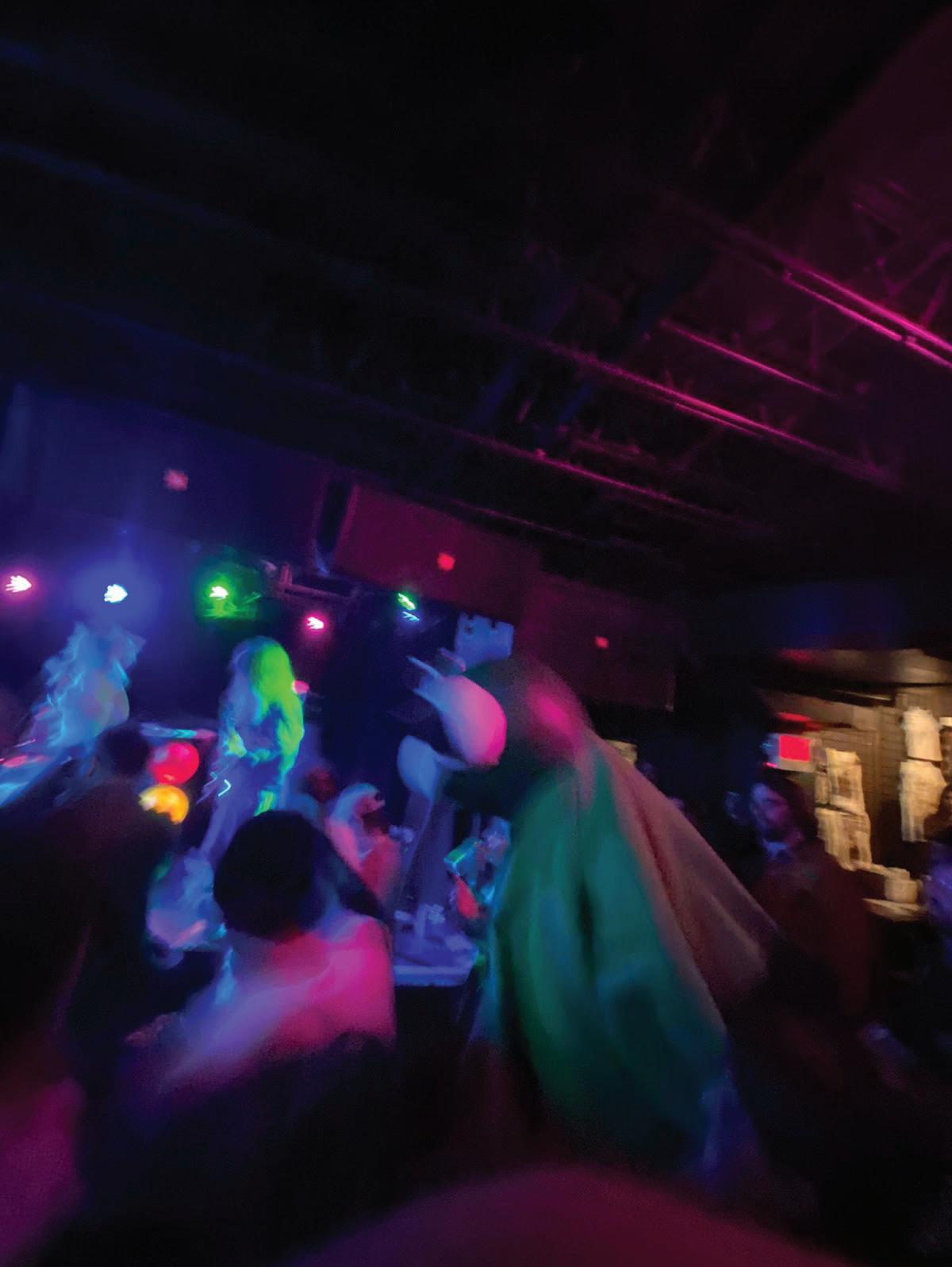
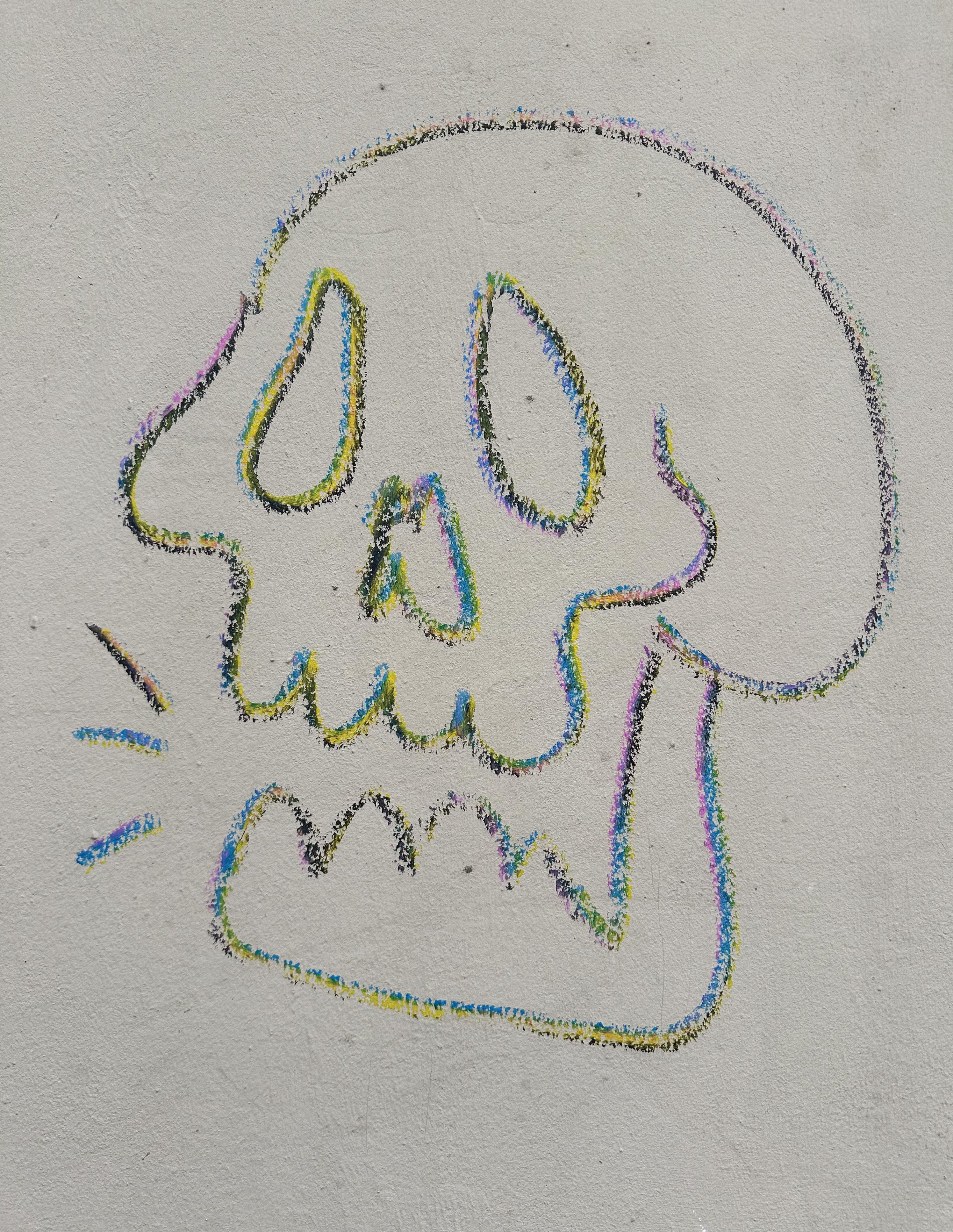
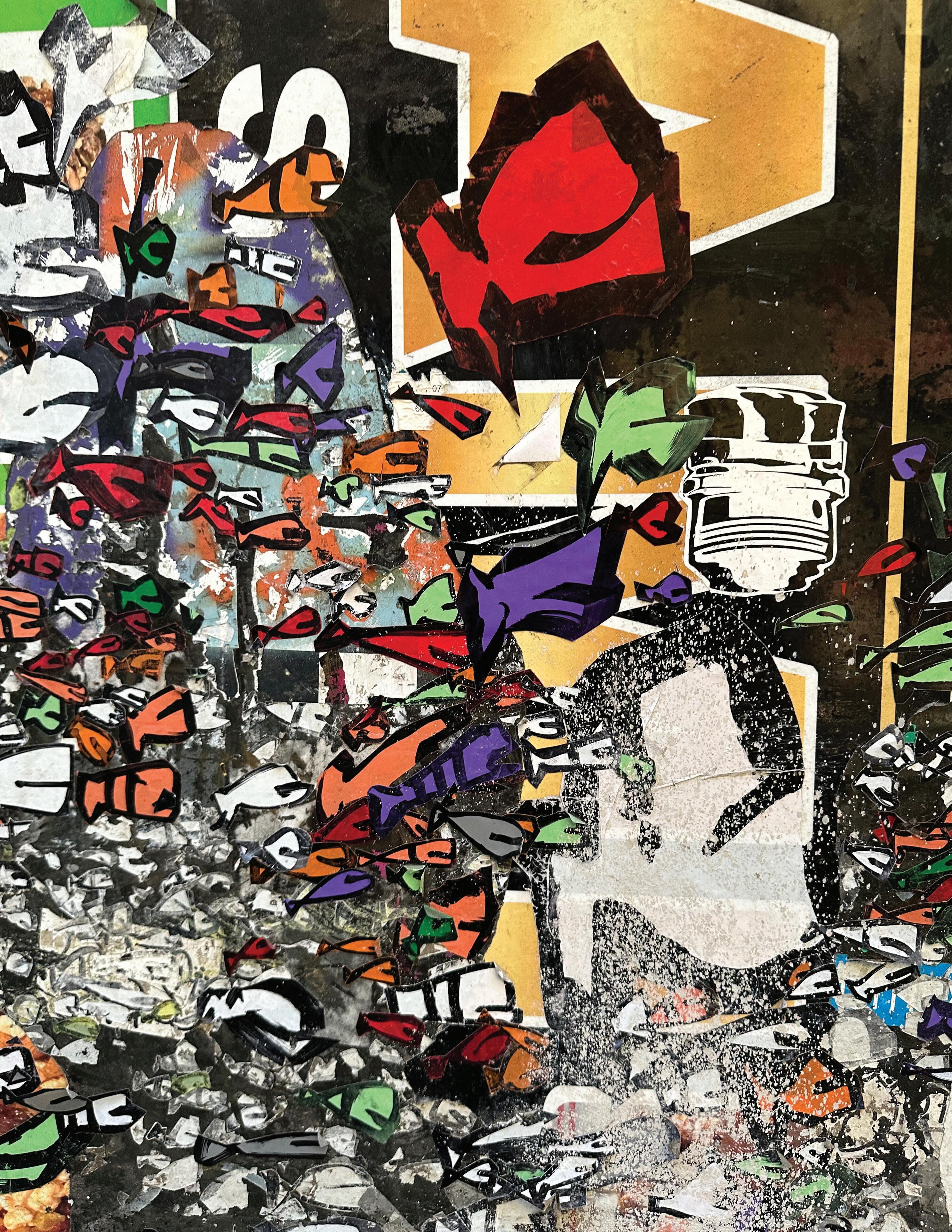


you have never heard of this song (probably)by sofia durdag
It was mid-December and it had been raining for weeks. In this crucible of extremely soggy grass and Christmas shopping, my mother and I decided to put on a legal drama named L..A. Law that had first premiered in 1987. Our decision began as a joke, but it did not end as one. We were expecting shoulder pads, reams of paper, fax machines, wood-paneled court rooms, chronically permed hair, car phones, and some antiquated social values.
We were not expecting, however, the most musically satisfying television theme song we had ever heard in our entire lives. The intro begins with a wailing saxophone playing over a black screen. The saxophone is then fiercely punctuated with both the auditory and visual slam of a car boot. The license plate reads “LA LAW”. Immediately, I understood that this intro was going to go hard.
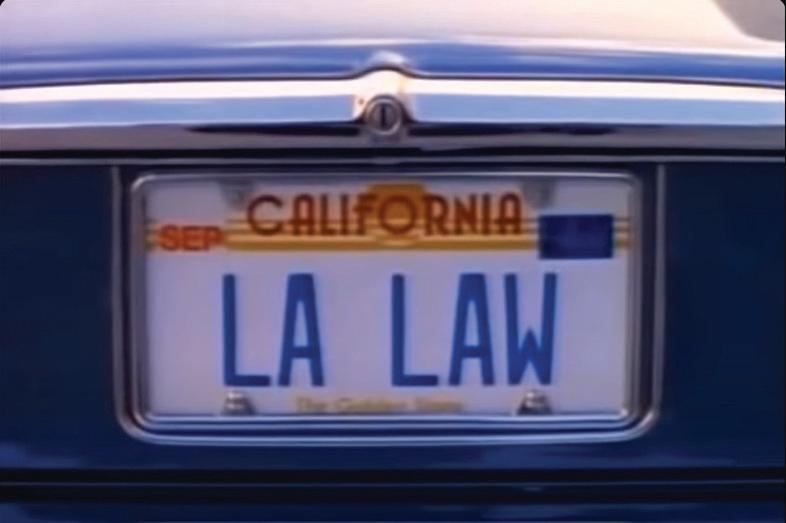
A still from the intro. Sadly, the image is from a YouTube video that says “I don’t trust the results of the 2020 election” in its description.
The opening theme demands to be heard, to be viscerally felt. The bombastic horn line and moving strings play over a dull slideshow presentation of the cast walking and talking in various exotic locales such as: conference room, hallway, and weirdly decorated office. By God, parts of the intro linger on aerial views of traffic. The music is the critical element, written by Mike Post specifically for the show. Thank you, Mike Post!
The theme is so perfectly suited to a program whose first minute begins with both a gunshot and a dead body (unrelated!). The combination of the rollicking drumline, screaming saxes, thundering horn motif, flirty clarinet riffs, and a delicate but stirring strings section amounts to an exhilarating, intense, and strangely danceable experience. It is authoritative, yet playful. Stern, yet exuberant. It announces that you are about to watch a show where in a single season, a district attorney delivers a romantic monologue to a man in a gorilla costume and survives an assassination attempt with equal levels of gravitas.


My mother and I loved both the theme song and the show, its soapiness and sudden seriousness, the weird time-warp quality it had.
But the critical thing to note about the intro is that it is very long. For example, Suits, a modern cable legal drama, has a similar intro of a half a minute. The intro to L.A. Law is triple that length. The streaming service we watched the show on had no “skip intro” button, so my mother and I listened to it, in full, for each episode. And it only got better with each listen! I found new favorite sections, novel layers within each brightly stacked melody. I would leap up from the couch as if prodded with a cattle rod, yowling along to the saxophone solos.
The song and the show it represents is so maximally and sincerely of its time, which is to say it is dated. But I enjoy its lack of immediate relevance, the comfort of its sameness. L.A. Law’s theme song has the bittersweetness of borrowed nostalgia, my mother musing about extra-strength hairspray and dot matrix printers. I love you, L.A. Law.
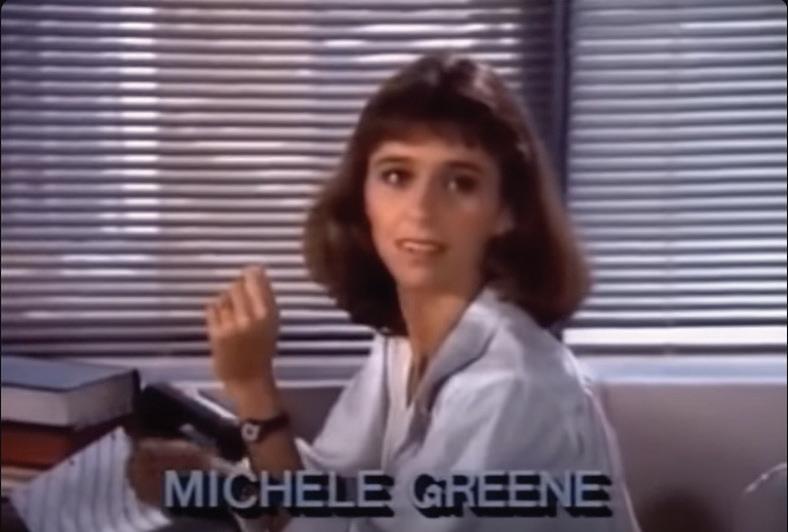
From my favorite part of the theme song. Unfortunately, also from the same YouTube video.
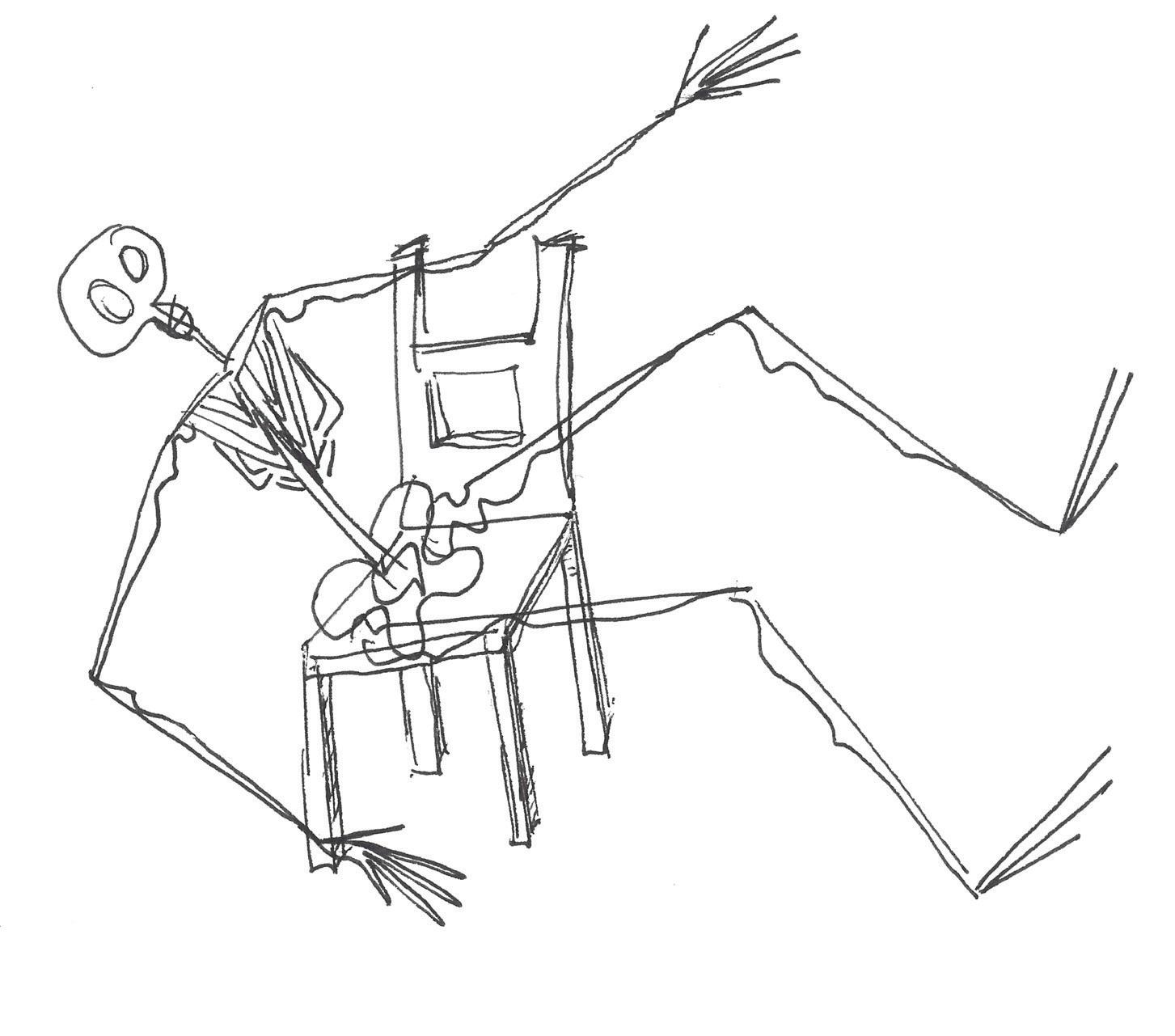
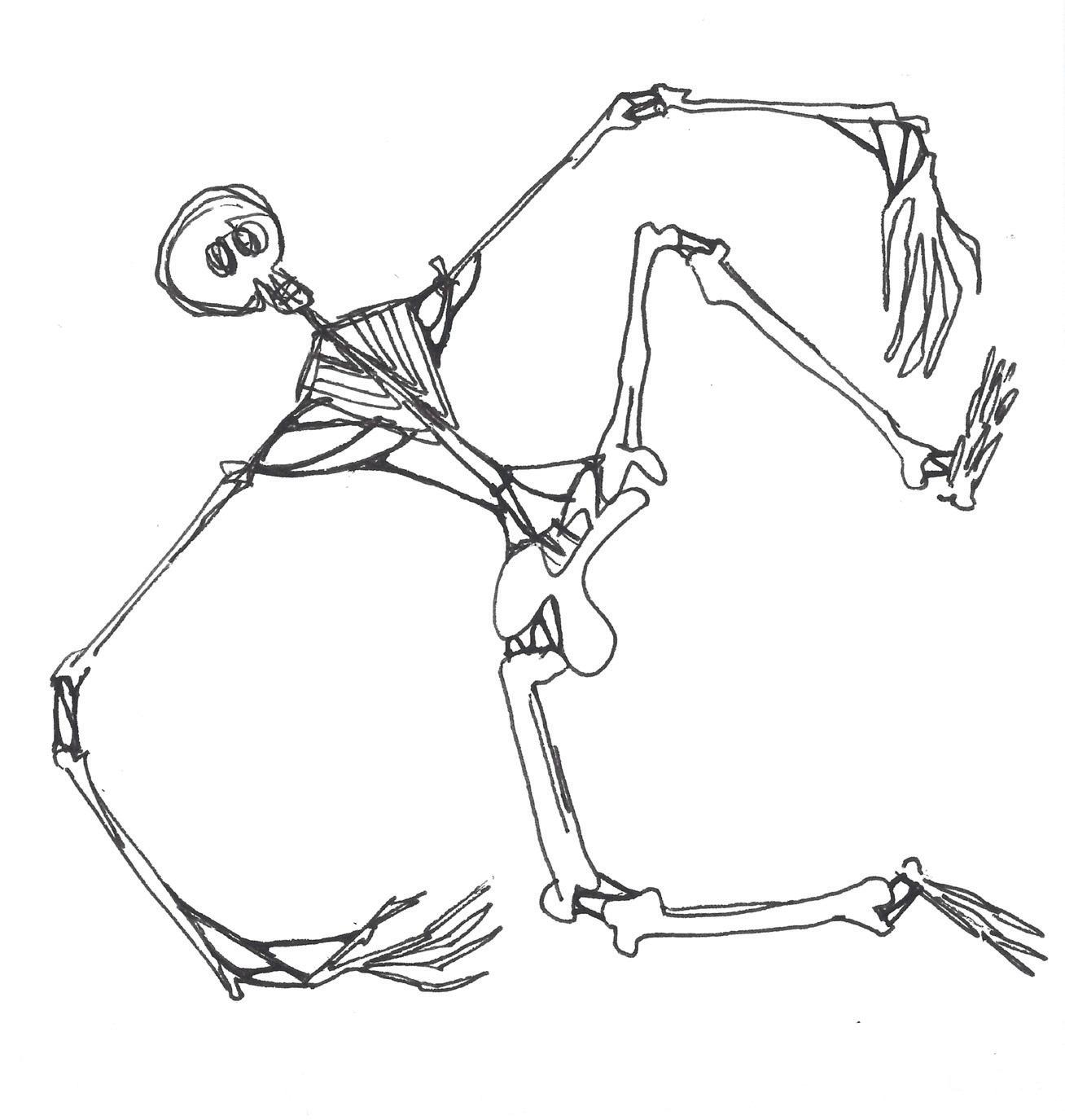
[skeletons
One thought led to four— four thousand or so. In threes having tea and in twos making love leaving me as the one: DIDN’T SLEEP ANY WHITS!

So when music starts playing— or continues again. I’m eating the organ and washing hair in the synth, with cymbals carbonated:
IT’S SOAKING IN THROUGH MY SKIN!
And it all starts to blend— the air and .wavs.
My ear-eyes wide open and my eye-ears kept peeled, all my thoughts wisely spent: AN EMPTY HEAD CAN BE FILLED WITH EACH AND EVERY SOUND; IT DOESN’T REMEMBER HOW THEY ARE MEANT TO TASTE!


Winter term was...well, it happened. I found lots of awesome new stuff and also kept ripping the classics. Here are my top ten takeaways!







I’d like to take this time to talk to you about something very important to me: 2000s indie music from New York. While many bands have come out of this scene, I would like to shed some light on a band that deserves much more attention than they get, and that band is Ivy. Ivy is a trio consisting of Dominique Durand, Adam Schlesinger (also a part of Fountains of Wayne), and Andy Chase. Their album Long Distance has been a staple of my listening cycle over the past two terms with its delightful array of tunes. This album rips. And when I say rips, I mean it.
It effortlessly combines the twee aesthetics of early 2000s indie pop, that same era kick, computer and ambient sounds, and mesmerizing vocal performances. The album uses these sounds to produce a peak romantic feeling complete with a few notable tracks including “While We’re In Love,” “I Think Of You,” and “One More Last Kiss.”
“While We’re in Love” is a mid-tempo clean cut indie sleaze song about two people who are not meant to be together. Dominique croons “we know it won’t last forever / ‘C=cause we’re not meant to be together / make the best of a bad situation / face the fear and the desperation” during the chorus of the song over some electronic chord strums and a drum machine-esque percussive line. Background vocals of “ah bah dah bah dah” echo over various parts of the song, drenched in reverb, which carries the song almost as an underlick. This album truly does it all.
“I Think Of You” opens with a soft synth wave and some arpeggiated guitar underneath Dominique’s vocal intro, highlighting her ethereal voice and French pop influence, before a rocking drum line enters that propels the bass to come in. This song reflects longing so well, making you want to reminisce on your relationships and maybe even text your ex. She sings “so don’t give up / baby, don’t give in / if we try, we can begin again / I know what we’ve been through / but I still think of you” in a pre-chorus section that precedes a layered chorus with “ah-uh-ah” backgrounds and synthy goodness. The textures of this song invite love into hearts and peace into the minds of the weary.
“One More Last Kiss” is a song that I think you all should experience without any notion of how it is going to sound before your first listen. It is a song I listen to nearly every day now purely because it brightens my life. While you’re at it, you should listen to the entire album as it will surely invite some more love into your life. And who doesn’t need that.
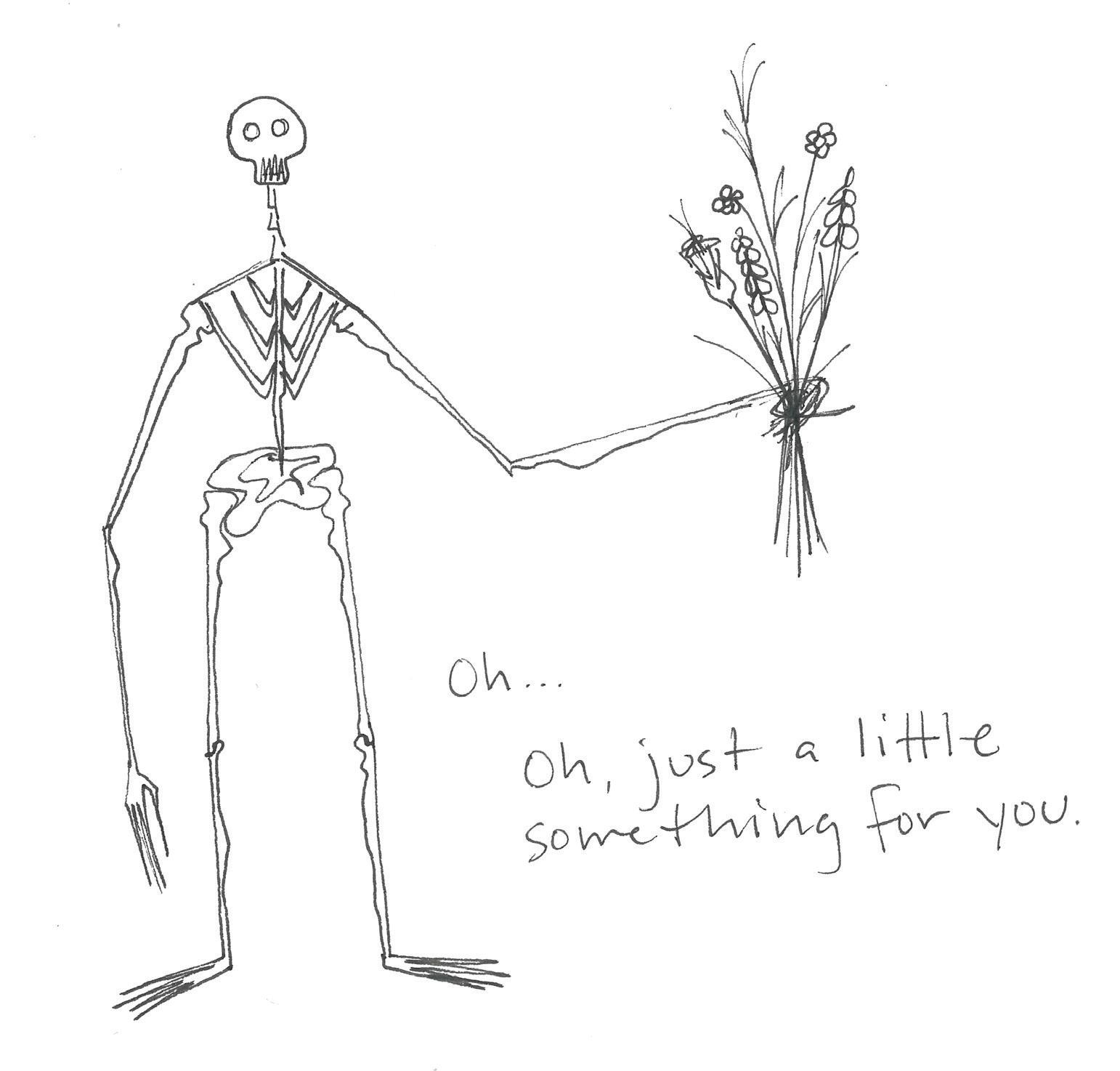
THIS HAS BEEN AN ISSUE OF NO FIDELITY. THANK YOU FOR READING.